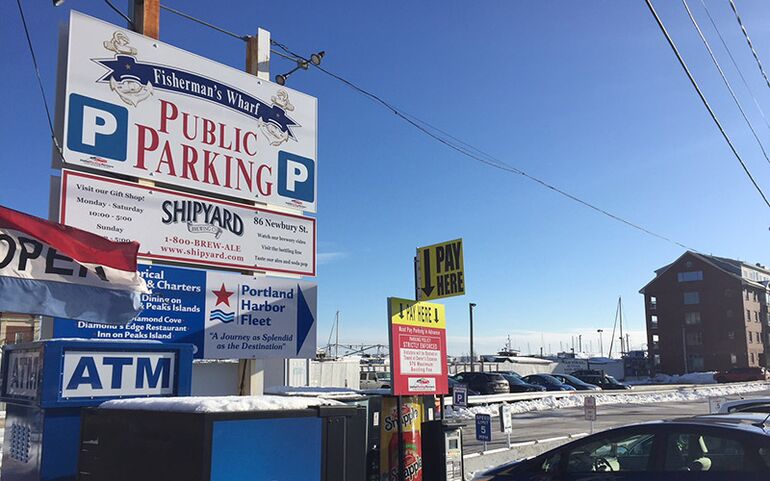Fisherman's Wharf developer: Waterfront's big issue is traffic
 Photo / Peter Van Allen
A view of the site for the proposed $40 million Fisherman's Wharf mixed-use development project on Portland's Commercial Street.
Photo / Peter Van Allen
A view of the site for the proposed $40 million Fisherman's Wharf mixed-use development project on Portland's Commercial Street.
A Portland developer who's already altered a mixed-use development plan for Fisherman's Pier in light of concerns about the city's working waterfront, says the issue is more about traffic and a traditional waterfront that includes a variety of uses than about fishermen being elbowed out.
As the planning board prepares to discuss amendments to the Waterfront Central Zone that restrict some commercial uses, David Bateman, of Bateman Partners LLC, is urging the board to not consider zoning for the waterfront "in the stark terms of fisherman vs. developer."
"Portland's working waterfront is an extremely complex and inter-connected ecosystem of fishermen, lobstermen, restaurants, transportation, shipping, maritime support/supplies, retail stores, provisions and many other traditional uses," Bateman said in a four-page letter to City Manager Jon Jennings.
The 4:30 p.m. planning board workshop is scheduled to look at proposed amendments to zoning on the waterfront as proposed by the Working Waterfront Group, which was formed in December to address concerns about development on the water side of Commercial Street. A six-month moratorium on waterfront development was enacted while the group forms a proposal.
Bateman Partners LLC plans a $40 million mixed-use development for Fisherman's Wharf that includes parking for 500 cars, retail and office pace, but in January dropped the 93-room hotel that was part of the plan. The project is the heart of the zone that's under review, between the Portland Fish Exchange and DiMillo's restaurant.
The hotel plan was dropped after the city said it would go ahead with zoning changes as recommended by the Working Waterfront Group.
Bateman, in his letter, said he's satisfied his firm has been given a voice in the discussions about waterfront zoning, and appreciates the work the waterfront group has done. Nevertheless, he wrote, the focus is not where it should be.
"Portland's waterfront is more vibrant than it's been in decades and features a healthy mix of commercial uses," he said. He added that no "factual information" has been presented by the Working Waterfront Group "to show current zoning isn't working," and that other wharf owners say there's ample room for fishermen.
"Let's face it, everyone's major gripe, including the fishermen, is traffic," he said. "Commercial Street is a very successful and busy place, and therefor it has a traffic problem."
Pointing out that his firm has set aside $70,000 for a traffic study, he added, "I am acutely disappointed that rather than exploring creative and concrete solutions to mitigate problems like vehicular traffic, poor signalization and an irrational system of pedestrian crosswalks, the WWG has been focused elsewhere."
He said moratoriums, referendum votes and redrawing zoning lines are "regressive," and that revenue from taxable property in the proposed zone will help improve the infrastructure for the working waterfront.
Proposed amendments
Proposed in January, the zoning amendment would prohibit conditional or contract zoning — project-specific use changes within a zone — in the Waterfront Central District, which stretches from Deake’s Wharf, just east of the Casco Bay Bridge, to the Maine State Pier on the water side of Commercial Street. It includes 14 private piers and most of the city’s commercial fishing fleet.
"The draft amendments being proposed are based upon an intensive, months-long discussion and analysis of the WCZ zoning standards, and translate as general recommendations from the WWG," the report for tonight's meeting says. "Where complete consensus was not possible, amendments were based upon the group’s majority position. The goal of this process has been to identify and facilitate the appropriate balance
between marine and non-marine uses, accounting for their respective operational needs so that they may
successfully coexist and contribute to Portland’s working waterfront."
Jennings said in January the zoning "would take the uncertainty out of future developments" on the waterfront.
The planning board summary of proposed amendments says there is a broad range, "although many are very minor in nature."
The most substantive are reducing the area of the Non-Marine Use Overlay Zone (proposed as the Commercial Street Overlay Zone), eliminating some non-marine uses such as restaurants and retail establishments from areas outside that zone and increasing the pier edge setback from five feet to 10 feet, eliminating contract and conditional rezoning. The proposal says that move would both streamlining and strength performance standards to ensure compatibility between marine and non-marine uses.'
A December 2018 waterfront inventory study said that parking and other issues have crowded out some aspects of marine use, including storage.










1 Comments